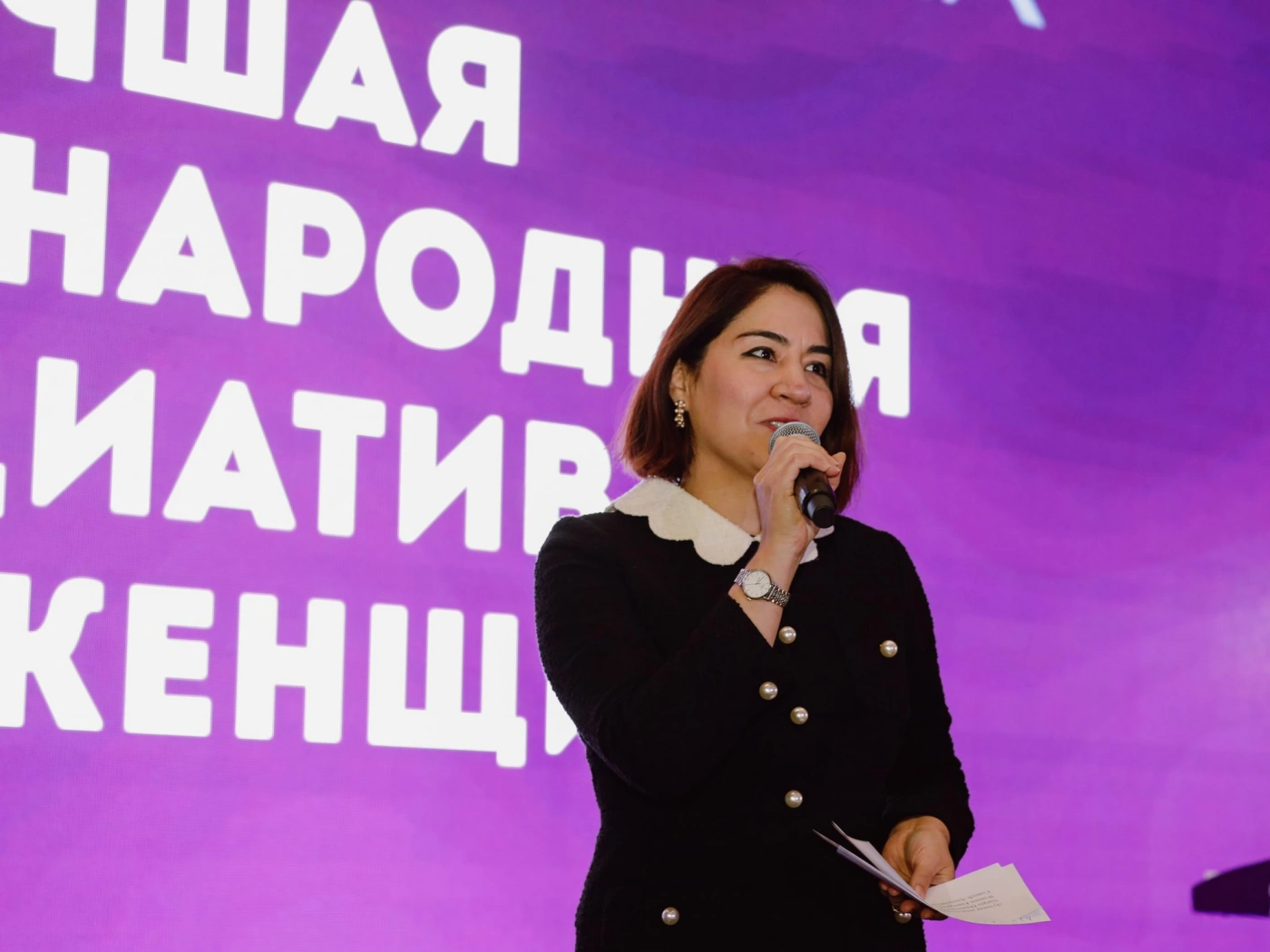
Nargis Dustmatova: Women are not just users of fintech — they are building it
Nargis Dustmatova, a prominent CAMCA Network member from Uzbekistan, is a key voice in Central Asia’s fintech landscape. As Chairwoman of the Fintech Association of Uzbekistan and Managing Director at Finextra, she leads efforts to expand digital finance across the region.
At the 2025 CAMCA Forum in Ulaanbatar, Mongolia, she was interviewed on the future of fintech in Central Asia, sharing insights on innovation, regulation, and financial inclusion.
Read STEPPE’s new interview with Nargis on the subject of Uzbekistan’s role in fintech, and innovation.
— You are at the origin of the development of the fintech ecosystem in Uzbekistan. What is happening now with fintech in Central Asia as a whole? How would you describe the current state?
Over the past few years, Uzbekistan has emerged as a regional leader in fintech development. Many international fintech players, investors and donors have entered the market. Hence the formation of the Fintech Association was important in order to develop the required regulatory reforms, voice for the market, and build a strong public-private sector collaboration. What began as a foundational push to build the ecosystem has evolved into a broader movement that’s now spreading across Central Asia.
Currently, fintech in Central Asia is entering a critical phase of acceleration and diversification. Countries like Kazakhstan and Kyrgyzstan are strengthening their regulatory frameworks and innovation ecosystems, while Uzbekistan continues to embark on its digitalization journey as well as open new markets, build its branding, and expand access, especially for underbanked and underserved populations. Little known, that Uzbekistan has already championed and implemented for mass adoption Open Finance/Open Banking infrastructure before the terminology emerged.
We’re seeing an increased interest in digital payments, embedded finance, alternative lending models, and cross-border e-commerce enablement. The conversation has shifted from simple digitalization to ecosystem building — with local startups, banks, regulators, and international players engaging in deeper collaboration. The rise of associations, alliances like the Turkic States Fintech Alliance, IT Park Global Initiatives and support from international organizations is helping harmonize efforts across borders.
However, challenges remain: fragmented banking infrastructure, gaps in digital literacy, and limited early-stage capital. But these challenges also represent opportunities for regional cooperation, knowledge sharing, and innovation tailored to local needs.
— What countries in the region are moving faster in the development of digital financial solutions, and why?
Among Central Asian countries, Kazakhstan and Uzbekistan are currently moving the fastest in the development of digital financial solutions, but for different strategic reasons. Kazakhstan has a more mature financial system and digital infrastructure, which gives it a head start.
Kazakhstan has made significant strides in fintech, driven by a market-oriented approach and strong private sector leadership. The country benefits from a relatively advanced regulatory environment, including a fintech sandbox and innovation hubs like the Astana International Financial Centre (AIFC), which attract both investment and cross-border collaboration. High internet and smartphone usage supports the widespread adoption of mobile banking and digital payments. Kazakhstan is also home to notable fintech success stories such as Kaspi.kz, which seamlessly integrates finance, e-commerce, and payments into one powerful ecosystem. With robust investor backing and rapid consumer adoption, fintech startups in Kazakhstan are scaling quickly.
In contrast, Uzbekistan’s fintech growth is fueled by strategic government reforms and close coordination between regulators and the private sector. The country has set ambitious financial inclusion goals, particularly targeting women and rural communities. Uzbekistan has experienced rapid growth in payment systems, e-wallets, crypto shops, and micro finance platforms, while also advancing open banking infrastructure and digital retail services. The government’s vision to establish Uzbekistan as Central Asia’s tech hub is supported by initiatives like IT PARK, which foster innovation, entrepreneurship, and foreign investment. The rise of domestic unicorns such as UZUM, which made it to Crunchbase, showcases the country’s momentum in building a vibrant and inclusive fintech ecosystem.
Kyrgyzstan has a smaller market but is making significant strides, particularly in mobile wallets and remittance-linked fintech, due to a high number of citizens working abroad. As well as there is a growing interest in blockchain and crypto applications, driven by grassroots demand and fewer regulatory restrictions.
Most importantly, the Fintech Association of Uzbekistan sees a lot of successful collaboration among Central Asian countries. We are sure to expect shortly the introduction of new regional payment standards, Regional Open Banking schemes, Antifraud alliances and multi currency Wallets for our nationals.
— What role do government initiatives play in the development of fintech? Where is it possible to create a favorable environment, and where, on the contrary, does the regulator inhibit innovation?
Uzbekistan’s fintech ecosystem is primarily policy-driven, with the government playing a central role in shaping its development. Key institutions like the Central Bank of Uzbekistan (CBU) and the National Agency for Perspective Projects (NAPP) have been instrumental in this process. The CBU handles licensing, supervision, and ensures overall financial stability, while NAPP is focused on promoting innovation in areas such as e-commerce, blockchain, cryptocurrency, payments, and newly emerging sectors like gambling and crypto shop licensing. Notably, NAPP also operates a regulatory sandbox, allowing fintech companies to test new products under regulatory oversight. However, navigating regulation remains complex, making public-private dialogue facilitated by the Fintech Association essential for balanced policy development.
A prime example of this delicate balance is the regulation of Buy Now, Pay Later (BNPL) services. BNPL is gaining significant traction in Uzbekistan, with current transaction volumes around $800 million and projections to reach $1.2 billion within a year. This growth is fueled by a population with limited access to traditional credit, a rapidly expanding e-commerce sector, and strong consumer interest in accessible, low-barrier financial products. As such, BNPL represents both an opportunity for financial inclusion and a regulatory challenge, requiring careful oversight to protect consumers while fostering innovation.
However, BNPL touches on sensitive regulatory areas: One of the unique features of the BNPL model in Uzbekistan is the automatic debt deduction from the debtor’s physical bank cards. This mechanism is uncommon globally and has positioned Uzbekistan as an attractive destination for international investors, with many local BNPL providers actively securing foreign investment.
At the same time, this innovation brings significant responsibility for the regulator — to protect consumer rights without undermining the country’s growing fintech investment climate. The regulator must also address the rise in fraudulent schemes associated with BNPL and find the right balance between innovation, consumer safety, and market integrity.
Uzbekistan, the government and regulators have built strong momentum for digital finance, but the future of products like BNPL depends on regulatory clarity and trust-building between innovators and supervisors.
— You have helped more than 1500 women entrepreneurs in Uzbekistan, Tajikistan and Kazakhstan. What are the main barriers you see for women in entrepreneurship today?
Fintech Association of Uzbekistan has introduced various projects such as WEFinTech (capacity building on e-commerce and digital skillset), WeRise (business Accelerator) and WeGrant (grant support to WeFintech Alumni). We have developed rich international partnerships and alliances as passionate as we are for women’s support and equal access to knowledge and finances. We are extremely grateful to our partners for building the impact with us.
Over the past few years, the Association has supported over 1500 women entrepreneurs across Uzbekistan, Tajikistan, and Kazakhstan through training, mentorship, and access to digital tools. While women’s resilience and creativity are inspiring, the barriers they face remain both structural and deeply rooted in social norms.
One of the biggest barriers to women’s participation in fintech and entrepreneurship is limited access to financial resources. Many women lack collateral, formal income proof, or credit history, making it difficult to secure loans from traditional banks. In rural areas, microfinance options are scarce, and although digital lending is on the rise, a lack of digital education continues to exclude many women. Additionally, access to smartphones, mobile internet, and digital literacy training is significantly lower among women in conservative or remote regions, further hindering their ability to engage with fintech tools, register businesses online, or participate in e-commerce. Beyond technological and financial limitations, women also face challenges in accessing professional networks, accelerators, and mentorship opportunities—resources that are critical for gaining informal knowledge, building partnerships, and unlocking business growth.
What’s encouraging is that women are not just passive recipients of support — they are actively building solutions, mentoring others, and advocating for change. With the right combination of digital inclusion, accessible finance, mentorship, and policy reform, women entrepreneurs in Central Asia can unlock a wave of innovation, local job creation, and inclusive economic growth. We have 3 years of intensive plans to continue to work on building WEFintech, WeRise and WeGrant.
— How effectively can digital tools address the challenges of access to finance for women and SMEs in general?
We believe that digital tools can accelerate entrepreneurship, helping SMEs — especially women-led businesses to scale faster, automate operations, and access finance more efficiently. Through mobile-based solutions, entrepreneurs can apply for loans without visiting a bank, manage sales with minimal paperwork, and streamline day-to-day processes that would otherwise require time and staff they may not have. Importantly, digital tools also enable women to participate more fully in the economy by lowering traditional barriers and offering greater flexibility and autonomy.
From our experience working with over 1500 women entrepreneurs, the most impactful tools include digital marketing (which helps women sell more online and reach new customer segments), e-commerce platforms, e-invoicing systems, and mobile loan applications that offer instant credit decisions. All of this is accessible through a smartphone, often with minimal upfront cost. However, a growing concern is the rise of digital fraud, as most SMEs lack the knowledge, tools, or budget to protect themselves — making cybersecurity education and protection essential for sustainable growth.
— What would you recommend to female entrepreneurs from Uzbekistan who want to implement fintech solutions in their business, but do not know where to start?
Start with Your Business Needs, Not the Technology: Begin by identifying the challenges in your current operations. Do you need to accept digital payments, manage invoices, track inventory, apply for a loan, or sell?
Join communities, forums, or associations where women entrepreneurs share practical advice. The WE Fintech program and similar initiatives offer hands-on training and mentorship for using digital tools . Moreover, we see a lot of partnerships, alliances and job placements during such community gatherings. Women trust real cases, and real people behind any success. So, network and connect with people of your interest!
— How do you assess Uzbekistan’s readiness to introduce more sophisticated fintech tools — such as crowdfunding, digital identification, alternative scoring systems?
Generally, digital product and mobile apps are very sophisticated in Uzbekistan. Leaders such as Click, Payme, Paynet have a strong marketshare and user base. We see good tools for P2P transactions, quick loan applications and other products that are now embedded with other services. Fintech companies are investing a lot in assessing creditworthiness especially in BNPL and micro loans.
Uzbekistan has made progress in digitizing public services and IDs, but seamless integration into fintech platforms (e.g. for onboarding or cross-border transactions) still has certain Gaps, making KYC prone to increased social engineering and AI. This will require further strengthening and further sophisticated privacy rules and integration with more services to identify scam and fraud.
When it comes to crowdfunding, it’s still at an early stage with no formal legal framework and terminology. There is clear interest from MSMEs but trust, regulation, and platform credibility must be built.
— You are working with governments to regulate VC and startups. What legislative steps are needed to ensure that more VC’s and start-ups in Uzbekistan are able to enter the market?
To support the growth of venture capital (VC) and startup activity in Uzbekistan, it’s crucial to introduce a Legal Definition of “Risky Investment” key terms like venture capital, angel investor, startup, and high-risk investment, creating a dedicated legal space for early-stage innovation.
As well as it’s important to define, develop, and improve tax and reporting rules for startups. VC investments are usually treated as income, while a new form and tax code should be developed and assigned.
Equally important is the legalization of standard early-stage financing tools such as SAFE (Simple Agreement for Future Equity) notes and convertible loans, which currently have no legal recognition in Uzbekistan. These instruments are widely used across the globe for their simplicity and ability to defer valuation while minimizing founder dilution. Their introduction would significantly increase the availability of seed-stage capital. Furthermore, establishing a reliable and transparent dispute settlement mechanism for international VCs is essential to ensure investor confidence. Without a trusted system to enforce agreements and resolve conflicts fairly, global investors may be hesitant to enter the market. Implementing these legal and policy reforms would create a more attractive and functional environment for both local and foreign VC participation.
The Uzbekistan Government recognizes the importance of Governing VC-startup relationship especially around disputes and checks and balances which require a blend of legal clarity, speed, affordability, and investor/founder balance. By proactively developing this framework, Uzbekistan can create a safer, more attractive venture environment while protecting its entrepreneurs and investors.
— What global trends in fintech do you think are particularly important for developing countries like Kazakhstan and Uzbekistan?
Uzbekistan and Kazakhstan are emerging as leaders in fintech and digital innovation in Central Asia, creating a strong foundation for regional collaboration. As developing economies with growing digital infrastructure, both countries are well-positioned to capitalize on global fintech trends — not just locally, but by building cross-border, interoperable platforms that serve the entire region.
One of the most transformative opportunities lies in creating regional fintech projects with unified payment standards — paving the way for a «Revolut-style» super app offering multi-currency (fiat and crypto) transactions, embedded investment products, and personalized financial tools for MSMEs and retailers. This could dramatically improve access to finance, streamline cross-border trade, and accelerate digital entrepreneurship — especially for micro and small business owners (MSMEs)
Globally, trends such as embedded finance, alternative credit scoring, banking-as-a-service (BaaS), wallet interoperability, tokenized assets, and AI-driven personalization are shaping the next generation of digital financial tools. These are especially relevant for developing countries like Uzbekistan and Kazakhstan, where traditional banking may be limited but mobile penetration and digital literacy are rising.
— What mistakes are most often made by startups in the region, and how can they be avoided?
Many common startup mistakes, seen not only in Central Asia but globally, stem from a lack of preparation and foundational planning. One of the most frequent errors is launching a product without properly testing market demand, leading to solutions that fail to address real user needs. Additionally, many startups operate without a clear financial model, often confusing revenue with profit, which results in unsustainable business practices. Legal oversight is an another critical issue which founders frequently neglect, essential areas such as shareholder agreements, intellectual property protection, and compliance, especially in regulated sectors like fintech. These oversights often come back to hurt startups at crucial growth stages.
Another emerging concern — or perhaps a question mark rather than a proven mistake, is the growing number of startups built entirely on top of AI platforms. While leveraging AI tools can be highly effective for rapid MVP development, there are valid questions about the long-term sustainability, scalability, and defensibility of such models. Relying too heavily on third-party AI infrastructure may limit differentiation and create bottlenecks when transitioning from prototype to a full-scale business — especially for those aiming to build unicorn-level ventures. Only time will tell how resilient these startups will be as they grow.
— What inspires you most in your work today?
What inspires me most today is seeing how technology can create real, measurable impact — especially for those who’ve traditionally been excluded from financial systems. Whether it’s a woman in a rural area launching her first online business, or a young founder building a fintech solution that solves a local problem, these stories are a reminder that innovation isn’t just about code or funding — it’s about unlocking opportunity.
What also motivates me is the collaborative energy across Central Asia right now — governments, startups, and investors are beginning to work together more closely than ever. Being part of that momentum and helping shape ecosystems that are more inclusive, more innovative, and more sustainable is incredibly fulfilling.
— What book, course or speaker would you recommend to those who want to understand fintech and its potential in our region?
I think most people in fintech have come across Brett King — his work is excellent for understanding both how fintech operates today and what the future of financial services may look like. For a deeper dive from a regulatory and strategic perspective, I highly recommend David Shrier, who was my module leader at Oxford University’s fintech course. He has a remarkable ability to simplify complex technologies and explain their real-world adoption.
When it comes to courses, I believe it’s essential to continuously update your knowledge if you’re seriously interested in fintech. The industry evolves rapidly, so recommending a single course today may quickly become outdated. Instead, I encourage professionals to consistently follow leading education platforms and tech-focused institutions that invest in developing the next generation of fintech leaders.





